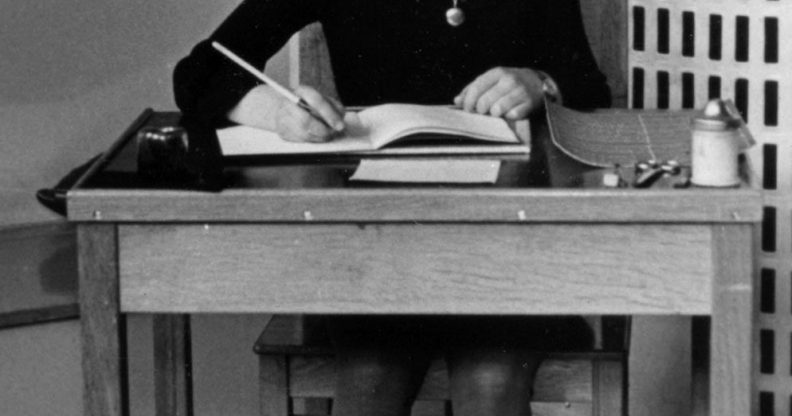Anne Frank was attracted to girls

Holocaust victim and famous diarist Anne Frank was attracted to girls.
The Jewish teenager whose diary became one of the most-read first-person accounts of the Holocaust wrote about her sexuality in a sometimes-censored passage.
Anne and her family attempted to escape the Nazi regime but were trapped, hiding in Amsterdam.
They were discovered by the Nazis in 1944, and transported to concentration camps. Anne died aged 15 at Bergen-Belsen, not long before the Allies liberated the camp.
Earlier this year, people all over the world drew parallels between the Muslim ban in the US and the struggles of Jewish people including Anne who tried to find refuge in the US during World War II.
Anne and her family – including her father Otto, her mother Edith and sister Margot – attempted to obtain US visas.
And the family’s story was recalled as thousands of Muslims were turned away at the border.
Anne wrote in the diary she kept while trapped that psychologist Sis Heyster had stated that “girls of this age don’t feel quite certain of themselves”.
They “discover that they themselves are individuals with ideas, thoughts, and habits,” she wrote that the psychologist had said.
Anne continued: “After I came here, when I was just fourteen, I began to think about myself sooner than most girls, and to know that I am a ‘person.’
“Sometimes, when I lie in bed at night, I have a terrible desire to feel my breasts and to listen to the quiet rhythmic beat of my heart.”
Speaking about her best friend Jacqueline van Maarsen, the teenager continued: “I already had these kinds of feelings subconsciously before I came here”.
She added: “I remember that once when I slept with a girl friend I had a strong desire to kiss her, and that I did do so.
“I could not help being terribly inquisitive over her body, for she had always kept it hidden from me.
“I asked her whether, as a proof of our friendship, we should feel one another’s breasts, but she refused.”
Anne added: “I go into ecstasies every time I see the naked figure of a woman, such as Venus, for example.
“It strikes me as so wonderful and exquisite that I have difficulty in stopping the tears rolling down my cheeks.
“If only I had a girl friend!”
On the official Anne Frank website, Jacqueline wrote about her relationship with Anne.
“We had a close relationship and I liked being with her, but she laid a claim on me and I didn’t know how to handle that.”
She continued: “I always had to prove to her that we were ‘best friends’. Her passionate declarations of friendship were too much for me sometimes.
“Then I met up with other friends and she was jealous and unhappy.”
“Years later I read that she had written about this in her diary.
“But before she went into hiding I had been able to tell her where the limits were.
“She accepted this and it only improved our friendship and made it stronger.”
Anne also wrote about her friend Peter in the diary, saying: “It gave me a wonderful feeling when I looked into his dark blue eyes and saw how bashful my unexpected visit had made him.
“I could read his innermost thoughts, and in his face I saw a look of helplessness and uncertainty as to how to behave, and at the same time a flicker of awareness of his masculinity.
She continued: “I saw his shyness, and I melted.
“I wanted to say, ‘Tell me about yourself. Look beneath my chatty exterior.’ But I found that it was easier to think up questions than to ask them.”
Anne never defined her sexuality, and it may not have been the most important fact about her.
She was a teenage refugee, after all.
But it is important to shed light on times historical figures have expressed same-sex attraction.
As Twitter user Rachel has pointed out, the passage is rarely discussed, and not widely known.
There is enough straightwashing of history.
The director of the Royal Shakespeare Company said in 2017 that William Shakespeare may well have been gay.
Artistic director Greg Doran confirmed long running rumours that the playwright was likely to be homosexual, adding that the Victorians changed his work to hide the truth.
Doran also said that a number of plays written by Shakespeare include LGBT characters, which the company can no longer ignore.
In 2015, a US radio host compared the plight of a pizzeria which said it would not provide pizzas for a same-sex wedding to Anne Frank, saying gays “trap good-hearted American families in their home.”
The owners of Memories Pizza in Walkerton, Indiana said they would use the newly passed Religious Freedom Restoration Act to refuse to serve pizza at a gay wedding.
One of the owners, Crystal O’Connor, said: “If a gay couple was to come in and they wanted us to provide pizzas for their wedding, we would have to say no.”
Donations to support the pizzeria reached around a million dollars.
How did this story make you feel?

